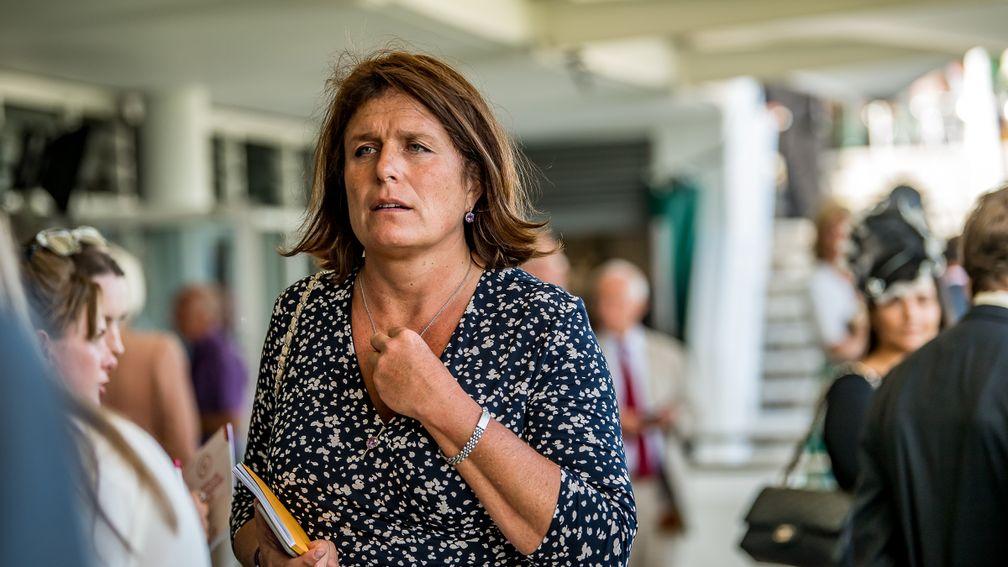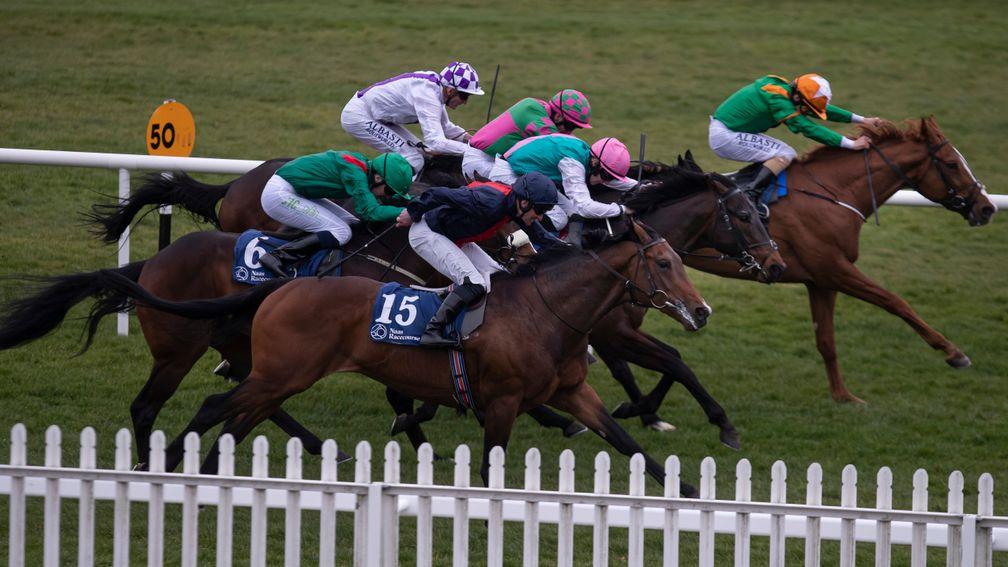'Curbs on travel are greatly limiting the scope of my work'
Industry figures tell us how they are managing in self-isolation

Equine veterinary surgeon Mathilde Texier tells us about how she is managing – both personally and professionally – with the Europe-wide lockdown to slow the spread of the coronavirus
How is life ticking over for you in lockdown?
I came back from Australia in early March, having attended all the yearling sales in Australia and New Zealand in January and February.
The intention was to go back to Sydney in early April for the Inglis Easter Yearling Sale, but the whole world seemed to shut down more or less at the same time, with the event becoming an online auction, Australia closing its borders and the UK imposing the lockdown.
So I've been in my house in North Norfolk for the last two months gardening, DIYing, reading, listening to music, playing the piano, walking, cycling, taking photographs and so on.
Have you been able to see horses on farms? And is it at all possible to do any vet work remotely?
The professional guidance from the Royal College of Veterinary Surgeons has restricted our activity to emergencies and essential work only, which are not services I routinely carry out, so I've done almost no veterinary work for the last two months.
All pre-purchase examinations and survey radiographs of yearlings had to be cancelled or postponed. The only routine work which continued in equine veterinary practices was the reproductive work, as the stud season was not interrupted.
Even if we can now start to do more, travel restrictions are greatly limiting the scope of my work.
I regularly receive radiographs or veterinary reports from colleagues, trainers, breeders, pinhookers and consignors for a second opinion, so I've done some online and telephone work, and I'm a Hong Kong Jockey Club nominated veterinarian, so I've received a few Hong Kong vetting reports and images to assess. But with no racing in Europe, very few horses have been purchased privately.
You are usually flying to sales all around the world, in both hemispheres. Are you missing the travelling?
I usually enjoy being at home in March after being away for two months, but we're now in May and there are only so many weeds you can remove from a garden, so I'm ready to hit the road again!
What do you think of online sales if they had to happen in Europe this year?
I'm a keen clinician and always like to examine a horse clinically before I look at diagnostic images. Unfortunately, I believe there is too much emphasis on radiographs nowadays and online sales are based on the concept that if you have looked at the images and videos available in the online repository, you have vetted the horse.
In fact, you have only seen a small piece of the puzzle and you need to correlate your findings with your clinical judgement. A trainer will eventually have to train the horse and not their x-rays!
Breeders rarely get broodmares vetted prior to purchase, as long as all the paperwork is in order, but weanlings, yearlings and horses of racing age still need to be assessed clinically.
Photographs and videos vary too much in quality. Just like they can flatter a plain horse or condemn a nice horse, they can exaggerate a fault or mask a blemish.

The North American Jockey Club livened up lockdown by announcing the 140-mare stallion cap – would you welcome a similar move in Europe from a veterinary perspective?
I don't think there is any veterinary issue with the current system, as modern ultrasound scanners and medication to induce ovulation in cycling mares have greatly improved fertility and reduced covering requirements, allowing stallions to cover more mares without increasing their load.
Thoroughbred stallions are naturally capped anyway, as the breeding season is restricted to a specific period, and with no artificial insemination each stallion is limited to the number of mares they can successfully cover in a day.
Quotas can be a dangerous tool, just like subsidies. They can promote mediocrity. A good genetic selection programme should aim to improve a breed, not dilute it for the sake of genetic diversity.
The decision by the North American Jockey Club to cap the number of mares a stallion can cover is not a veterinary issue and I cannot directly comment on it, but it rather distracts from a much more critical issue: their controversial medication rules, with serious veterinary and animal welfare implications.
Do you think there will be any positives to come out of this crisis?
I hope people will have taken the time to pause and reflect on their positives and negatives.
We always have plenty of room for improvement, but usually little time to realise it or do anything about it. On a more global scale, this pandemic has exposed many failures in our care and health systems, which need to be resolved for future generations.
Any film, TV or book recommendations to share to get through home confinement?
I have closely followed the VE Day commemorations, read books and watched movies about World War Two. We must make sure our future generations are fully exposed to the atrocities of this still recent and such deadly conflict, so that they don't take peace for granted, especially among European countries.
I highly recommend The Volunteer, written by Jack Fairweather and recently published, which is the fascinating but chilling true story of a Polish underground fighter who infiltrated Auschwitz to report on Nazi crimes. I also watch John Simpson’s world press reviews and political reflections on YouTube.
With all this spare time, I've enjoyed studying other areas of interest not related to racing, veterinary medicine or Covid-19, like sustainable farming, nature conservation and other environmental issues.
With webinars, podcasts and Zoom conferences, the world is becoming a smaller place all the time, even without meeting anybody for the last two months!
What are you most looking forward to when racing returns?
Our industry is a close network of friends, so I miss the people and look forward to seeing them when the sales resume.
I absolutely love my job and also miss the horses, so I can't wait to jump back into my car – otherwise known as Speedy Nancy – and drive to all the racing stables and stud farms and cross the Channel and the Irish Sea.
I always enjoy my trips to Deauville, especially if I have time to drive down to the Loire Valley to visit my parents.
I also own a very small piece of Russian Emperor, who won impressively in Naas on the only day of Flat racing in Ireland so far this year, so the dream is still alive . . .
Read more Life in Lockdown Q&As with industry figures
Richard Knight: 'It's been great to see the sales companies work together'
Tony Fry: 'Would I buy a horse over the internet? I must admit I wouldn't'
Ed Harper: 'Our stud secretary says clients have never been so organised'
Adrian O'Brien: 'There are plenty of reasons to maintain a spring in the step'
Billy Jackson Stops: 'The buying bench is going to be heavily depleted'
Alex Elliott: 'Cooking and cycling were two things I never thought I could do'
Joey Cullen: 'Racing has the chance to showcase itself to a captive audience'
Claire Sheppard: 'The TBA had to move quickly to save the covering season'
Tomas Janda: 'Lower prices could encourage new buyers to get involved'
Matt Hall: 'Films are a waste of time – I watch festival replays instead'
Tom Goff: 'I've painted two garden seats. God, I sound so middle-aged!'
Simon Sweeting: 'Rightly or wrongly I'm having all my mares covered'
Richard Kent: 'Stud fees and sales house charges will have to come down'
Philippa Mains: 'The industry is a family and we help each other out'
Claire Goodwillie: 'People have realised if you're not online you're invisible'
Tina Rau: 'I'm enjoying post-dinner quarantinis with friends over video call'
Daniel Creighton: 'The market will recover – the only question is when'
Ed Player: 'We're happy to move with the times and embrace online trading'
Patrick Sells: 'Chasemore Farm is effectively operating in a bubble'
Chad Schumer: 'Racing in the US being cancelled is the biggest frustration'
Tom Blain: 'Trade will be down but all we can do is roll with the punches'
Ted Voute: 'We'll need to strengthen the way we showcase young stock'
Simon Kerins: 'We'll embrace any format that will help get horses sold'
Barry Lynch: 'The industry has often bounced back as quickly as it dipped'
Tim Lane: 'Working with horses does you the world of good in these times'
Jerry Horan: 'My sister butchered my haircut. I think it was payback'
Violet Hesketh and Mimi Wadham: 'Social distancing isn't hard - just lonely!'
Henry Beeby: 'Nick Nugent and I have entered a beard growing competition'
Charles O'Neill: 'ITM will be ready to go when the markets open up again'
Freddy Powell: 'We're improving our online sale platform in case it's needed'
Bumble Mitchell: 'Online sales could be tricky for outlying studs like mine'
David Stack: 'I had to give a garda a lesson about the birds and the bees'
Colm Sharkey: 'I've been torturing myself trying to sort out my golf swing'
Rachael Gowland: 'I didn't realise how much I loved racing until I couldn't go'
Sam Hoskins: 'I've been listening to endless Cold War podcasts on my tractor'
Niamh Spiller: 'Video calls are very important to keep everyone motivated'
Jamie Lloyd: 'Staff have had all their own gear labelled, even wheelbarrows'
Micheál Orlandi: 'The stallions are flying and that gives me great hope'
Richard Venn: 'The French are in a good position to get back racing sooner'
Tim Kent: 'It's difficult to plan when we don't know when racing will resume'
Russell Ferris: 'Weatherbys had contingency plans that we activated at once'
Grant and Tom Pritchard-Gordon: 'Inglis Easter has kept us busy since January'
Peter Hockenhull: 'The social side of meeting and chatting to breeders is gone'
Polly Bonnor: 'We've fulfilled every feed order, including all our exports'
Richard Lancaster: 'We're fortunate that some Shadwell staff live on site'
Published on inQ&As
Last updated
- 'Economic Security was about much more than just the racing' - owners call it quits after 27 years with Paul Webber
- 'Every new foal is an absolute joy' - owner-breeder reveals all about new Manor Farm Bloodstock venture
- 'Last year was brilliant but we have aspirations this year to go even further'
- 'I wouldn't swap any of our stallions as this is a long game'
- 'The need for a crystal ball seems even more desirable now than ever'
- 'Economic Security was about much more than just the racing' - owners call it quits after 27 years with Paul Webber
- 'Every new foal is an absolute joy' - owner-breeder reveals all about new Manor Farm Bloodstock venture
- 'Last year was brilliant but we have aspirations this year to go even further'
- 'I wouldn't swap any of our stallions as this is a long game'
- 'The need for a crystal ball seems even more desirable now than ever'